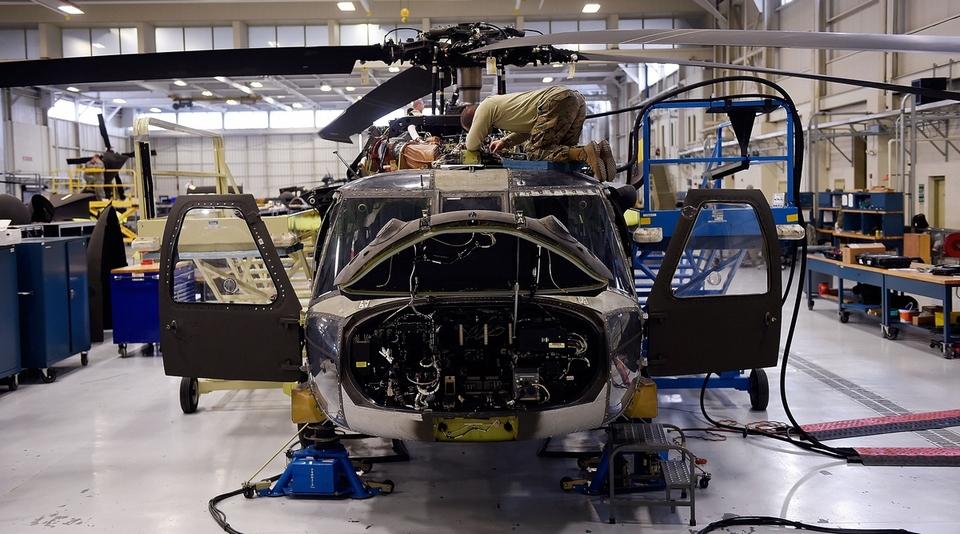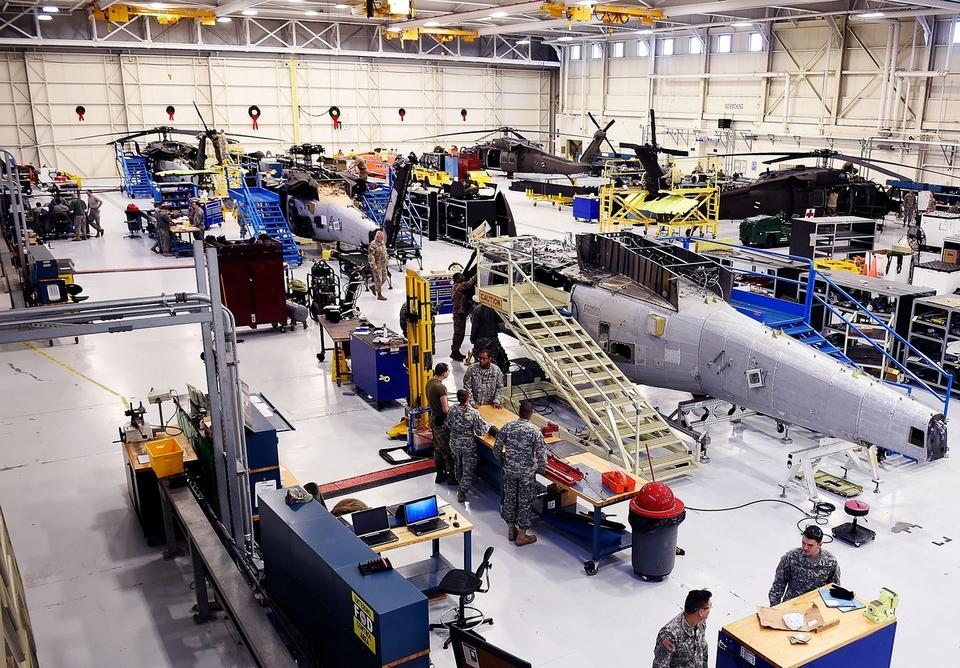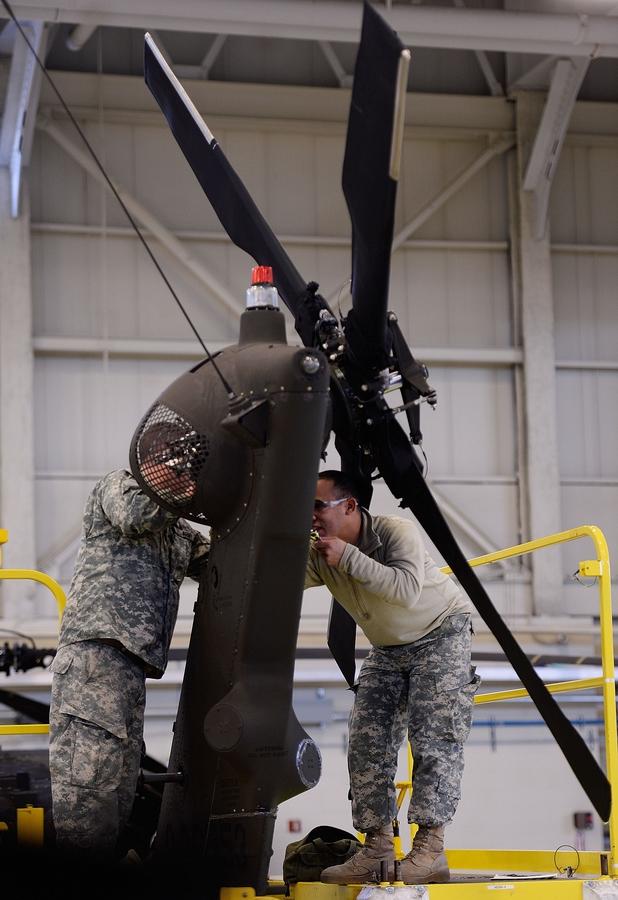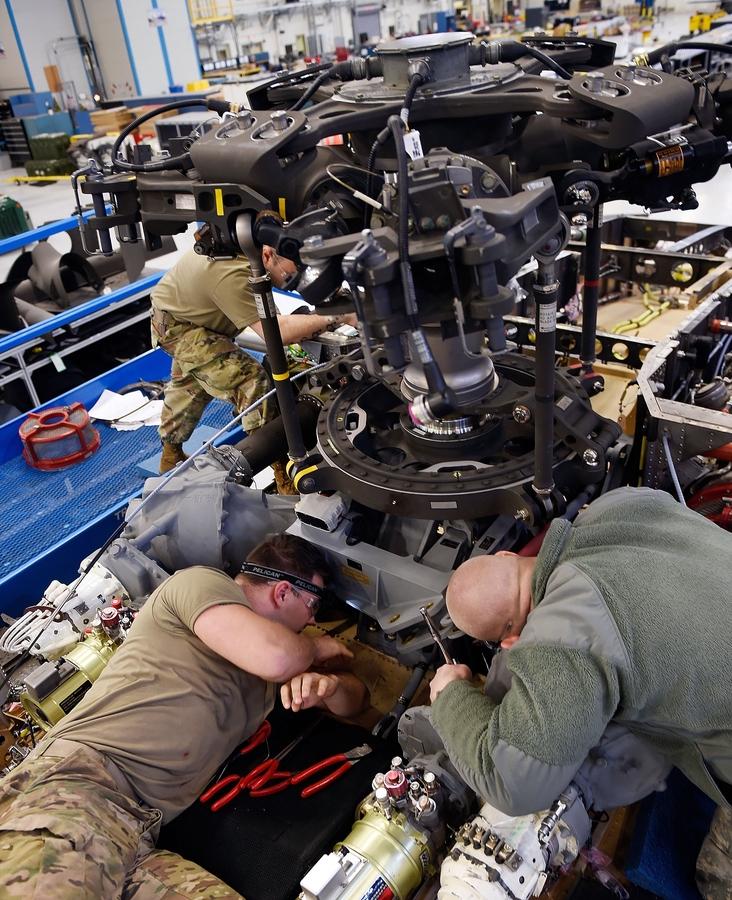Damaged Black Hawks Ready To Soar After Time In Groton Shop
By Julia Bergman
The Day
December 17, 2016

Crews at the 1109th Theater Aviation Sustainment Maintenance Group (TASMG) repair Black
Hawk helicopters Thursday, Dec. 15, 2016, in Groton. The 1109th is one of four TASMG units
in the country and is responsible for maintenance to extend the life of the U.S. military's vast
inventory of Black Hawk helicopters and other aircraft. (Sean D. Elliot/The Day)
Groton — After 2005, as the War on Terror raged on, a small National Guard unit at Groton-New London Airport worked quickly to patch up heavily damaged aircraft used in the fight and returned them to their units.
That changed in 2011 when the unit, the 1109th Theater Aviation Sustainment Maintenance Group, shifted to doing major structural inspections and repair of the Army's so-called workhorse, the Black Hawk helicopter, so that the aircraft can go 10 to 15 years without any unscheduled maintenance. Black Hawks cover a range of missions from responding to natural disasters to flying in warzones.
The Groton unit, one of four across the country, serves 14 states and 22 Army aviation support facilities. It responds to about 80 requests for aircraft work and repairs helicopters with battle or crash damage and makes major structural repairs and modifications.
At a cost of about $2 million per aircraft, compared to the $16 million it would cost to buy a new one, officials with the Groton group say their work is a prime example of cost-saving in government.
"We want the worst aircrafts in the fleet. That's how we can deliver the most bang for the buck to the taxpayer," Maj. Stephan Nowakowski, an aviation maintenance officer, said.

Crews at the 1109th Theater Aviation Sustainment Maintenance Group (TASMG) repair Black
Hawk helicopters Thursday, Dec. 15, 2016, in Groton. The 1109th is one of four TASMG units
in the country and is responsible for maintenance to extend the life of the U.S. military's vast
inventory of Black Hawk helicopters and other aircraft. (Sean D. Elliot/The Day)
The repair depot employs about 285 full-time employees during the week and about 200 full time on weekends. More than 400 National Guardsmen are assigned to the unit for weekend duty. The depot budget is about $20 million annually, of which 80 percent are labor costs. A mix of contractors and military personnel work at the facility.
The guardsmen assigned to the unit maintain an ambitious deployment schedule. From 60 to 100 deploy every 27 to 36 months for about nine months at a time. The group relies heavily on its contractors to provide stability, particularly during the deployments, and keep the work moving.
Many of the contractors previously served in the military, including Ray Marandola, 36, who was a helicopter mechanic in the U.S. Marine Corps.

Corporal Geoff Flynn, left, and specialist Jon Vega work on the tail of a Black Hawk helicopter at the
1109th Theater Aviation Sustainment Maintenance Group (TASMG) on Thursday, Dec. 15, 2016, in
Groton. The 1109th is one of four TASMG units in the country and is responsible for maintenance to
extend the life of the U.S. military's vast inventory of Black Hawk helicopters and other aircraft.
(Sean D. Elliot/The Day)
On a recent morning, a handful of Black Hawks built in the mid-1990s filled the space inside the shop. The damage to the helicopters, each with from 4,000 to 6,000 flight hours, varied.
Marandola is the lead mechanic for phase one of the repair program, when all of the aircraft's parts are completely disassembled so workers can look for any major frame damage, such as cracks, Marandola said. They then order any needed parts and install them.
Shift to phase five, the heaviest maintenance phase, when the Black Hawks are re-assembled. A series of testing is done before the aircraft is started, such as checking all the pilot's cockpit indications.
At the paint shop, which officials said has implemented increased safety and environmental practices over the years, the aircraft are repainted to protect them from corrosion.

1109th Theater Aviation Sustainment Maintenance Group specialist Timothy Moore, right,
Sgt. Kenneth Sousa, left, and Chad Deschamps, rear, work on the main rotor assembly of
a Black Hawk helicopter Thursday, Dec. 15, 2016, in Groton. The 1109th is one of four
TASMG units in the country and is responsible for maintenance to extend the life of the
U.S. military's vast inventory of Black Hawk helicopters and other aircraft.
(Sean D. Elliot/The Day)
The unit also keeps busy with blade production, repair work and engine overhaul and testing.
Steve Sampert, who oversees the blade production line, says he's repaired about 3,000 blades, some of which he's worked on five or six times. Sgt. Dave Delgado, an engine mechanic, said a lot of National Guard units don't have people like Sampert.
Every 45 days, ideally, the Black Hawks move ahead in the maintenance line, bringing them closer to going out the door. From start to finish, the process takes six to seven months, depending on the condition of the aircraft. Through the Black Hawk program, the group completes repairs to about eight aircraft a year.
Nowakoski and Capt. Chris Barker, maintenance division chief, fly the Black Hawks "on the other end," when they are finished being repaired, so they know personally that doing everything right is vital.
"It's a no-fail event," Barker said. "Every piece of the aircraft is looked at four to five times."
In addition to the Black Hawks, the unit also works on Chinook, Apache and Lakota aircraft.
Since 9/11, the unit has received about 3,500 requests for so-called sustainment-level maintenance from within its support region, and occasionally from outside of it. The jobs ranged from some that took just a few hours to others that took multiple weeks or months to complete.
The unit is being honored Sunday morning with a Freedom Salute ceremony in recognition of a deployment to the Middle East in 2015.

